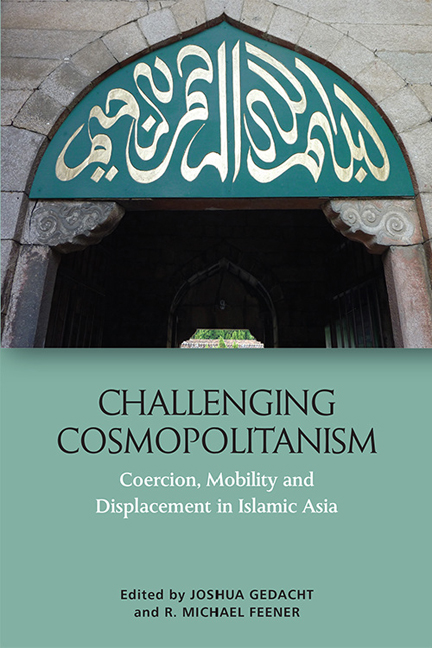Book contents
- Frontmatter
- Contents
- Preface
- 1 Hijra, Ḥajj and Muslim Mobilities: Considering Coercion and Asymmetrical Power Dynamics in Histories of Islamic Cosmopolitanism
- 2 Islamicate Cosmopolitanism from North Africa to Southeast Asia
- 3 Sufi Cosmopolitanism in the Seventeenth-century Indian Ocean: Sharīʿa, Lineage and Royal Power in Southeast Asia and the Maldives
- 4 The White Heron Called by the Muezzin: Shrines, Sufis and Warlords in Early Modern Java
- 5 Variations of ‘Islamic Military Cosmopolitanism’: The Survival Strategies of Hui Muslims during the Modern Period
- 6 Writing Cosmopolitan History in Nineteenth-century China: Li Huanyi’s Words and Deeds of Islamic Exemplars
- 7 The ‘Shaykh al-Islām of the Philippines’ and Coercive Cosmopolitanism in an Age of Global Empire
- 8 Bordering Malaya’s ‘Benighted Lands’: Frontiers of Race and Colonialism on the Malay Peninsula, 1887–1902
- 9 Afghanistan’s Cosmopolitan Trading Networks: A View From Yiwu, China
- Notes on the Contributors
- Index
5 - Variations of ‘Islamic Military Cosmopolitanism’: The Survival Strategies of Hui Muslims during the Modern Period
Published online by Cambridge University Press: 01 May 2021
- Frontmatter
- Contents
- Preface
- 1 Hijra, Ḥajj and Muslim Mobilities: Considering Coercion and Asymmetrical Power Dynamics in Histories of Islamic Cosmopolitanism
- 2 Islamicate Cosmopolitanism from North Africa to Southeast Asia
- 3 Sufi Cosmopolitanism in the Seventeenth-century Indian Ocean: Sharīʿa, Lineage and Royal Power in Southeast Asia and the Maldives
- 4 The White Heron Called by the Muezzin: Shrines, Sufis and Warlords in Early Modern Java
- 5 Variations of ‘Islamic Military Cosmopolitanism’: The Survival Strategies of Hui Muslims during the Modern Period
- 6 Writing Cosmopolitan History in Nineteenth-century China: Li Huanyi’s Words and Deeds of Islamic Exemplars
- 7 The ‘Shaykh al-Islām of the Philippines’ and Coercive Cosmopolitanism in an Age of Global Empire
- 8 Bordering Malaya’s ‘Benighted Lands’: Frontiers of Race and Colonialism on the Malay Peninsula, 1887–1902
- 9 Afghanistan’s Cosmopolitan Trading Networks: A View From Yiwu, China
- Notes on the Contributors
- Index
Summary
While classical doctrinal formulations of jihād declare it a duty incumbent upon the Islamic community, Muslims have not always hastened to the front line of the umma when they faced non-Muslims who exhibited aggression or threatened oppression. Rather, following other provisions of the sharīʿa, they sometimes chose to coexist alongside the outsiders without regarding them as enemies. Likewise, the rallying of Muslims to the armed defence of Islam did not necessarily exclude their affiliation with a non-Islamic state. These cases comprise alternative forms of what might be regarded as ‘Islamic military cosmopolitanism’; that is, interconnection of Muslims with non-Muslims as a result of lawful Islamic responses to aggression or external domination. Cosmopolitan situations created by Muslims who suffered hostility from non-Muslims varied depending on the historical context or the ways in which they coped with stress and violence emanating from beyond the umma.
This chapter explores variations of ‘Islamic military cosmopolitanism’ in the historical contexts of the Hui, Chinese-speaking Muslims of China, during the modern period. The first purpose of this exploration is to illuminate the coercive dimensions of majority power, warfare, and the nation-state in formations of cosmopolitanism in ways that problematise the unreflective use of the term as shorthand for tolerant interactions of people across ethnic and cultural boundaries. The second objective is to illustrate that in conceptualising specifically military forms of Islamic cosmopolitanism, we need to recognise that this did not always assume a universalistic form that required exclusive allegiance to the Islamic moral community and the rejection of other sources of authority – including even non-Islamic forms of law and statecraft. This is done here through an examination of the way in which Hui Muslims formulated historically contingent ideas of ‘Islamic military cosmopolitanism’ in the context of Chinese history.
This study begins with a discussion of arguments presented by Ma Anyi (1870–1943), a Hui Muslim scholar who classified China as dār al-ḥarb – and thus outside the dār al-Islām, the territory of the umma where the sharīʿa is in force. Thus, he legally exempted Hui Muslims from the fight against non-Muslim Chinese people and enabled the Hui to mingle in non-Islamic Chinese society while retaining their ‘Muslim-ness’. An important backdrop to Ma Anyi's work was the antagonism between Muslims and non-Muslims during and after the Yunnan Muslim rebellion (1856–1874), the repercussions of which threatened the very survival of the Huis in China.
- Type
- Chapter
- Information
- Challenging CosmopolitanismCoercion, Mobility and Displacement in Islamic Asia, pp. 121 - 144Publisher: Edinburgh University PressPrint publication year: 2018



